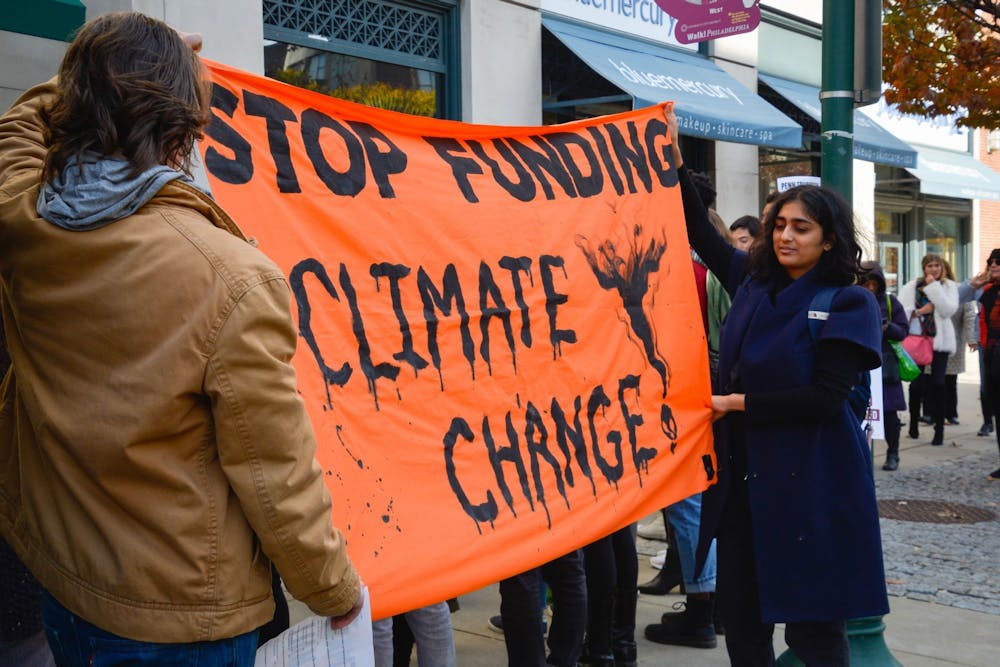All eight Ivy League student body presidents signed a joint resolution authored by Penn's Student Sustainability Association calling for each school to fully divest from fossil fuels.
The resolution, which also contains contributions from Penn’s Undergraduate Assembly, considers full divestment to be an end to new investments by Fiscal Year 2021, and complete divestment by Fiscal Year 2025. The resolution defines divestment as no investments in any of the top 200 fossil fuel companies; in companies that extract, process, transmit, or refine coal, oil, or gas; or in any utilities whose primary business function it is to burn fossil fuels for electricity.
University spokesperson Stephen MacCarthy did not respond to a request for comment on whether Penn’s administration is aware of the resolution or if it plans to act on it.
College junior and SSAP Co-Chair Vyshnavi Kosigishroff said Penn’s 2020 announcement not to invest in coal and tar sands, as well as its recent commitment to reach net-zero greenhouse gas emissions from endowment investments by 2050, are misleading and insufficient.
“SSAP, generally speaking, considers this announcement [of divestment by 2050] to be a lot of greenwashing, not really a commitment to anything, and really unambitious. [It] continues the narrative of Penn being really far behind our peer institutions,” Kosigishroff said.
Climate activists from SSAP and Fossil Free Penn criticized Penn’s plan for continuing to invest in fossil fuels. Penn’s plan for net-zero greenhouse gas emissions by 2050 puts it on the same timeline as that of the oil company BP.
Kosigishroff said there is a “really strong” financial case for full divestment, along with a moral imperative. She pointed to the University of California school system, which made the decision to divest from fossil fuels last year to invest instead in sustainable energy, which the school system said is better for the environment and a more financially promising investment than oil or gas.
One goal of the resolution is to change the narrative surrounding divestment to push Penn and the other Ivy League institutions to recognize its financial practicality, Kosigishroff said.
RELATED:
Yale Board of Trustees approves new guidelines for investing in fossil fuels
Penn received 389% more foreign donations in 2019 than in 2018, DP analysis finds
“The narrative right now is that this is a really niche ask that is coming from a bunch of naive climate activists who have no idea how the real world works, and how finance works at all. That's just not the case,” Kosigishroff said.
Kosigishroff emphasized the contradiction between Ivy League schools, including Penn, producing leading climate research, while continuing to fund the fossil fuel industry.
At Penn, Kosigishroff said, this conflict of interest is especially apparent. Several members of Penn's Board of Trustees have ties to fossil fuel industries, she said, most notably the incoming chair, Scott Bok.
Bok is the CEO of Greenhill & Co., Inc., an investment bank that advises and profits off of several companies involved in oil and gas extraction. In an interview with The Daily Pennsylvanian last November, Bok did not budge on student calls for divestment.
“Our trustees have a conflict of interest, so it’s not really a fair fight, even though the issue often is framed like that from the top,” Kosigishroff said.
The resolution points to the overwhelming support that divestment has among students and faculty across the Ivy League, with schools such as Harvard University passing referendums among faculty members on divestment, only for the issue to stagnate at the trustee level.
College senior and outgoing UA President Mercedes Owens said the resolution, about which SSAP approached the UA last year, was based on a similar effort passed by the Big Ten schools in early 2020. SSAP and the UA began to work on the resolution at the end of the 2019-2020 school year, Owens said, but the COVID-19 pandemic delayed progress.
Owens said the presidents of the other student bodies she contacted to join the resolution were all interested in helping, but getting approval from the student governments of each school took several months.
She added that the collaboration among Ivy League student governments is important because it makes the work of climate activists across the eight schools more visible to administrators and the public.
“As UA president, I have the privilege of being able to represent the voice of the student body in many different influential spaces, and so I really think that it's important for me to elevate the voices of our climate activists on campus,” she said.
Princeton University student body president Christian Potter said that the resolution was primarily symbolic, but showed the widespread support for divestment across schools.
“It's really sort of a symbolic call from the student governments of all these schools to show that there’s really broad support for this, not just in one school, not just in one corner of the Ivy League, but actually across the Ivy League,” Potter said.
Potter added that the demands for divestment among Princeton students prompted him to sign onto the resolution, citing a November 2020 referendum in which more than 80% of students who voted supported divesting.
Catherine Huang, president of the Cornell University Student Assembly, doesn’t anticipate Cornell to act on the resolution, especially since it recently announced a moratorium on new fossil fuel investments instead of full divestment. This moratorium, she said, means they fulfill only one of the two requirements of full divestment as outlined in the resolution.
“We're very proud of how far we’ve come,” Huang said. “But there's always the idea that this is not enough, that there's more to be done. And with every other Ivy League school signing on, [the resolution] shows that we stand united with our student bodies, advocating for the interests of the next generation.”
Huang also added that it was significant that the resolution was coming from student body leaders, as activists are often viewed by administrators as “too radical.” She said, however, that she happily signed onto the resolution as she believes it is in line with most students' beliefs.
Noah Harris, president of Harvard’s Undergraduate Council, similarly said that signing the resolution was a “no-brainer.” He added that while he believes Harvard’s administration often adopts a strategy of waiting out the most passionate students, fossil fuel divestment is too big of an issue for this tactic to succeed.
Harris added that although the resolution might not have an immediate impact on policy, the opportunity to join together with all seven other Ivy League student body presidents was exciting and turned up the pressure on all eight universities to divest from fossil fuels.
“We know how much of our student body is behind this, and we're always looking for opportunities to uplift their voices,” Harris said.









